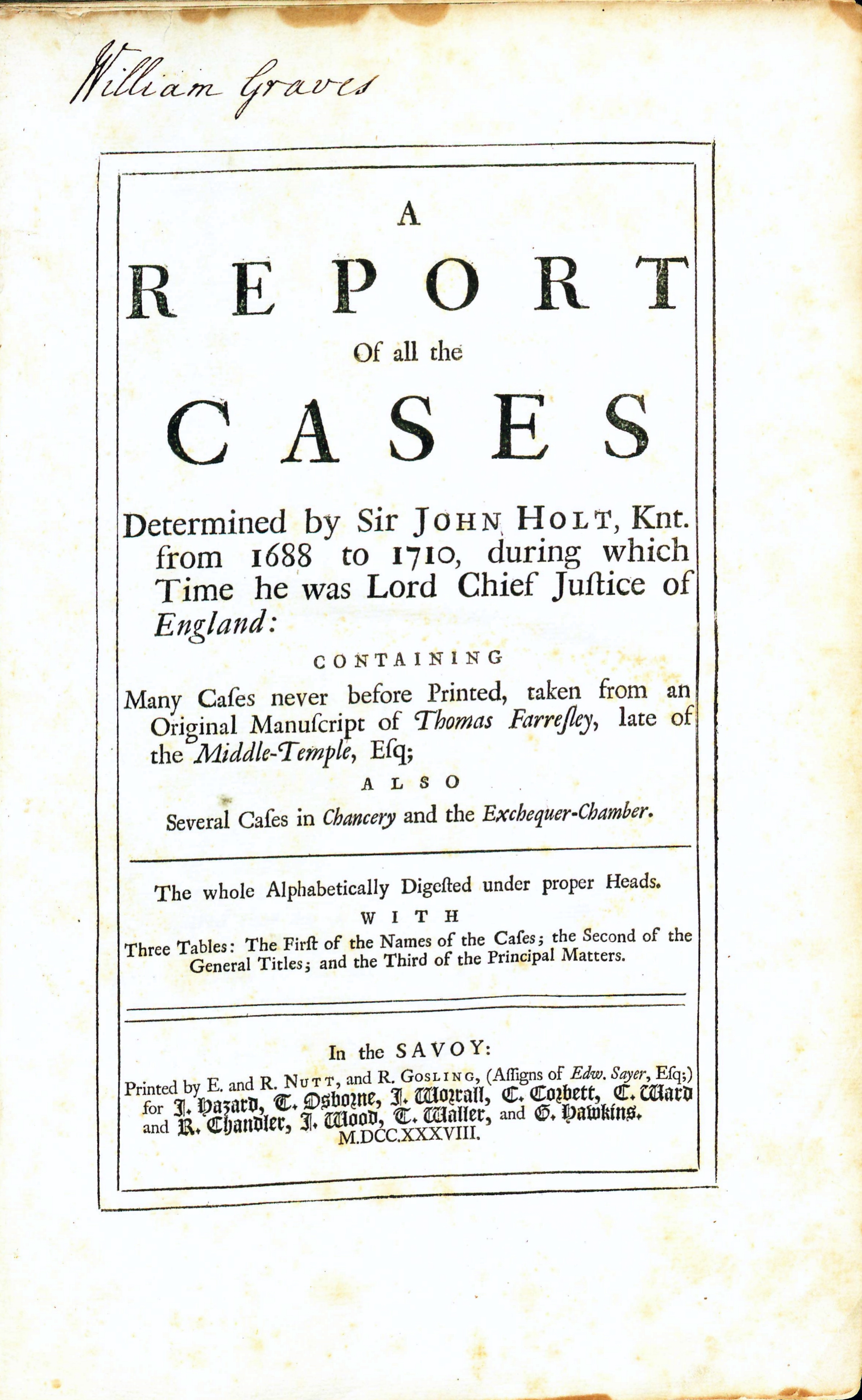A Report of All the Cases Determined by Sir John Holt, Knt. from 1688 to 1710, during the Time He was Lord Chief Justice of England
compiled by Thomas Farresley
| Holt's Reports | |
|
Title page from A Report of all the Cases Determined by Sir John Holt, Knt., George Wythe Collection, Wolf Law Library, College of William & Mary. | |
| Editor | Thomas Farresly |
| Published | London, In the Savoy: Printed by E. and R. Nutt and R. Gosling, Assigns of Edw. Sayer |
| Date | 1738 |
| Language | English |
| Pages | [2], iii, [17], 762, [90] |
| Desc. | Folio |
| Location | Shelf G-5 |
Sir John Holt (1642 – 1710) was admitted to Gray's Inn and called to the bar in February 1664 at the age of twenty-two.[1]. An accomplished barrister and ardent supporter of the monarchy, Holt was made sergeant-at-law in 1684 and received a knighthood from James II in 1686. When the king fled London in 1688, Holt became a legal adviser to the House of Lords and was "among those who suggested that James II had abdicated because his departure was a violation—and thus a renunciation—of his trust as king."[2]
In 1689, William III appointed Holt chief justice of the King's Bench. In this role, Holt became one of the most influential judges in seventeenth and eighteenth century England. Impressively, Holt exercised this influence through his case reports alone; he never authored a legal treatise. Holt served as Lord Chief Justice of England until his death in 1710.
A Report of All the Cases Determined by Sir John Holt, Knt. from 1688 to 1710 provides readers with details of the cases Holt presided over while holding the office of the Lord Chief Justice of England.[3] Compiled in the alphabetical format typical of abridgments, Holt's Reports includes material from a manuscript written by Thomas Farresley, as well as other sources.[4] As one historian commented, "Holt's rulings contributed significantly to the development of the law of commerce, of corporations, and of public administration. ... [H]is opinions ... show his erudition, the neatness of his mind, and the force of his ideas."[5]
Evidence for Inclusion in Wythe's Library
The Brown Bibliography[6] suggests Wythe owned the 1738 edition of A Report of All the Cases Determined by Sir John Holt, Knt. from 1688 to 1710 based on entries in the manuscript copy of John Marshall's commonplace book. Brown also notes that Wythe referenced Holt's Reports in his arguments for Bolling v. Bolling, "But in the opinion, he is not only single as in the other, but contradicted by Sir John Holt whose words pa. 306 are, 'when the obligee makes the obligor his executor, tho' it is a discharge of the action, yet the debt is assets ..."[7] The Wolf Law Library followed Brown's suggestion and purchased a copy of the 1738 edition of Holt's Reports.
Description of the Wolf Law Library's copy
Rebound in brown cloth with red morocco labels. Signed "William Graves" on the title page.
Images of the library's copy of this book are available on Flickr. View the record for this book in William & Mary's online catalog.
See also
References
- ↑ Paul D. Halliday, "Holt, Sir John (1642–1710)," Oxford Dictionary of National Biography (Oxford University Press, 2004- ), accessed February 16, 2015.
- ↑ Ibid.
- ↑ Great Britain. Court of King's Bench, Report of All the Cases Determined by Sir John Holt, Knt. from 1688 to 1710, during the Time He was Lord Chief Justice of England (London, In the Savoy: Printed by E. and R. Nutt and R. Gosling, Assigns of Edw. Sayer, 1738), i.
- ↑ Ibid.
- ↑ Halliday, "Holt, Sir John (1642-1710)."
- ↑ Bennie Brown, "The Library of George Wythe of Williamsburg and Richmond," (unpublished manuscript, May, 2012, rev. May, 2014) Microsoft Word file. Earlier edition available at: https://digitalarchive.wm.edu/handle/10288/13433
- ↑ Bernard Schwartz, Barbara Wilcie Kern, R. B. Bernstein, eds., Thomas Jefferson and Bolling v. Bolling: Law and the Legal Profession in Pres-Revolutionary America (San Marino, CA: The Huntington Library; New York: New York University School of Law, 1997), 333.
